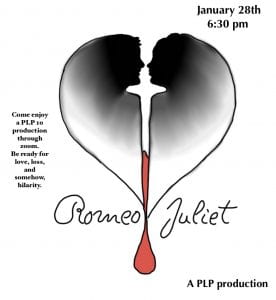Making an adapted version of the play Romeo and Juliet seems intimidating… and it was. Ever-expanding our time constraints, we completed two podcasts and a whole play in 4 weeks. Like most projects, a majority of the time was spent understanding, researching and planning to have the ability to have a great end product. In all pieces of work, more time should be spent doing planning than doing and this project represented that.
What is a Classic, or an adaptation? These were the questions we tried to solve with our two podcasts. In the format of a co-hosted podcast, Jude, Gabe and I had to tackle these questions while staying true to our overarching topic. Focusing on using the cohosted format to its full extent, we had two attempts to get it right. Applying our podcast planner helped arrange our ideas and have organized areas where we needed to discuss. In my latter podcast, I tried to make it more similar to my documentary type formats by using Descript (click here to read more about it) to edit out all filler words and shorten pauses. The program made editing easy but it opened up the door to edit every single thing we said. Editing the audio 1,000-2,000+ times, making it faster and easier to listen to. I then topped off both episodes with talking points by me in post-production and added effects to all of our voices in audacity.
Historical perspective – the basis of how we can overcome our current concerns, beliefs, and values to understand those of people in the past. We can never truly know what it was like at the time because we weren’t there to experience it. Videos, media and primary sources only take us so far and eventually people will be taking a historical perspective on Covid-19. There are limitations to the validity of the historical account. Unless time travel exists in the future nobody will be able to experience the historical event. Shakespeare’s plays were heavily adapted to written works by his friends and he took a historical perspective on the Capulets and Montague (click here to read more about that). Presentism plagues us when looking at old texts and we will only ever know the truth when we take the time to interpret it properly.
Our interpretations are taught to us by older generations that have different views and beliefs on historical events. Consciously or subconsciously, current perspectives, beliefs and events of the time influence how a thing is viewed and presented. Once someone believes a fact and it is proven wrong with facts, it makes them want to believe it more. The things people valued are reflected in their identity. Acts like murder had consequences in Romeo and Juliet, and the jokes were met with audience approval.
Watching the two most popular adaptations of Romeo and Juliet; Franco Zeffirelli in 1968 and Baz Luhrmann in 1996, we analyzed the different takes on the play. Taking notes as we watched the movies, on the direction techniques, clothes and characters of each movie. Showing two drastically different approaches and two good examples of how to adapt the play.
Our adaptation:
After approximately 600 words in and we finally talk about the big part of the project, exactly how our project reflected our time crunch. Making everything run smoothly we were decided into four groups; tech, script, creative and production. Despite the name, the tech team was almost entirely centred around music and sound effects. I was the co-DRI with Noah and I mainly focussed on music.
Originally we were asked to get music to record music and play the sound effects live. I recorded Duel of the Fates on piano and found a few copyright free music videos but PLP isn’t PLP without a twist. With the performance coming up in a few days we needed to rework all of our music to be live. We came up with the solution to play the piano live for every song and I had the responsibility of playing all the songs we chose live.
The difference between the first rehearsal and final performance was enormous. Every time we practiced we fixed major problems with the story and eventually went from unwatchable to decent. Changing the story to fluidly and logically makes sense from every act was our biggest priority when moving forward. The play itself went well and we successfully made Shakespeare appealing to a modern audience. Everything was great… except my performance before the play started. Being live-streamed, I froze and forgot everything I’ve learnt on the piano. It has shown me the line between pros and regular people is that they don’t fold under pressure. I stumbled under pressure from it being live and I did not play remotely to the best of my ability.
Despite the shortcomings of my piano performance, the rest of the project went fluently. Creating two podcasts is no small feat as well as a class-wide project to perform live. Feeling like 5 units, this project was filled with vastly different topics and it was a lot of fun despite the workload.


February 4, 2021 at 11:52 pm
Hi Anders
I enjoyed reading your blog post on your adaptation of Romeo and Juliet. I thought your blog post was very intriguing and well worded. I liked the fact that you added audio clips and links to your podcast.
February 9, 2021 at 5:05 am
Hi Anders, I really enjoyed reading your post. I liked how you clearly explained each part of the project. I watched your performance live and I really liked it and found it hilarious.